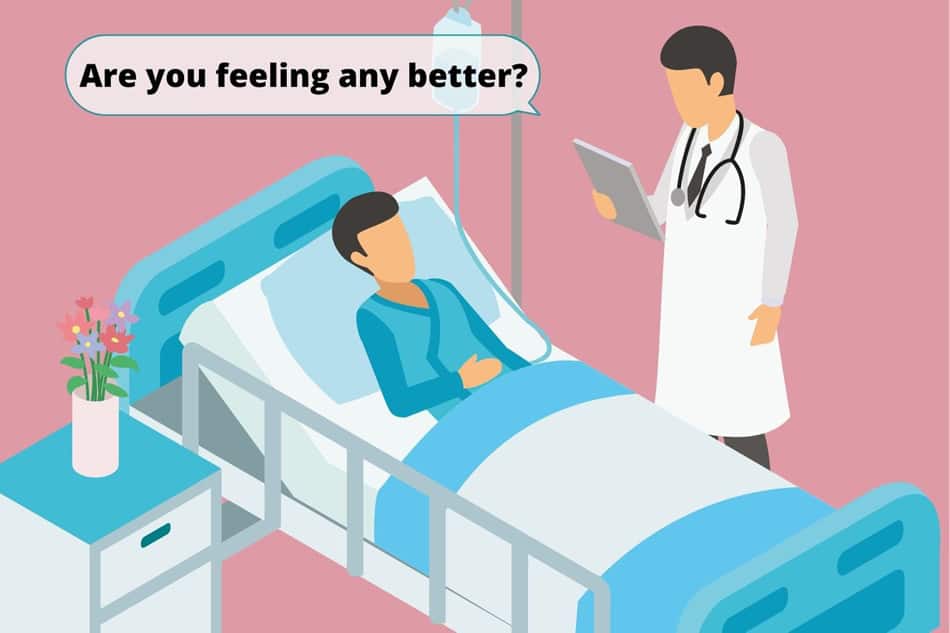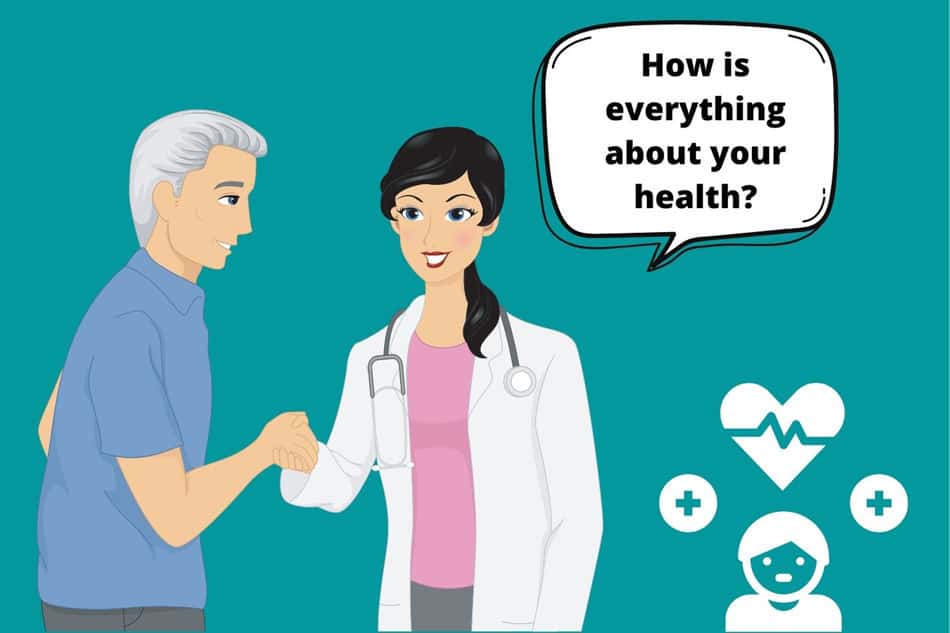This article covers the following areas –
- Does “How are you?” Make Sense while Asking about Health Issues?
- How to Ask about General Health Conditions
- Guide to Asking about Illness or Injury
- How to Ask about Mental Health Conditions
- Things to Consider While Talking about Someone’s Health Condition
- Final Words
- FAQ: Asking Someone About Their Health Condition
While asking about someone’s health conditions, you are expected to be very careful as health is a very sensitive issue. No one wants to offend a person while asking about his or her general health condition or any specific illness or injury. However, you may unknowingly hurt their emotions if you don’t know the appropriate expressions or phrases to ask about someone’s health conditions.
To inquire about someone’s health condition, use polite and considerate language. Phrases like “How have you been feeling lately?” or “I hope you’re doing well; how is your health?” show concern while respecting their privacy. Be empathetic and attentive to their response.
I conduct different drills and role-plays on various everyday issues in my ESL classroom, especially in the Spoken English course. During the role-plays on “Health & Fitness,” many of my students use “How are you?” to ask someone about their health condition. Is this correct, or are there any other appropriate phrases or expressions? What’s your take on that? You may share it with all of us in the comment box.
In the next parts of the post, I’ll come up with several phrases and expressions that native speakers of English use to ask people about their health conditions. These expressions will help you to start talking to someone about their health issues without offending or making them feel uncomfortable.
Well! If you are looking for a book or a guide to help you learn and improve your English, you may try English Made Easy Volume One: A New ESL Approach: Learning English Through Pictures (Amazon Link). This book creatively uses pictures and text in tandem to revolutionize English language learning, making it easier to understand and more effective overall.
Does “How are you?” Make Sense while Asking about Health Issues?
Many ESL/EFL learners mistakenly use “How are you?” to ask about someone’s health, but it doesn’t necessarily mean to ask about someone’s health. “How are you?” can be used as equivalent to “Hi” or “Hello” as part of socialization. It’s a formal way of greeting people expecting a response such as “I’m fine,” “I’m good,” etc.

If you’re very close to someone and care for their health, it’s better to ask directly about their health condition. You can say, for instance, “Are you feeling okay?” if it seems to you that the person is feeling unwell. If you know that someone is in physical pain, you can ask, “Where does it hurt?” And if you meet someone who’s recently recovered from a disease, you can say, “Do you feel better now?”
How to Ask about General Health Conditions

On different occasions, we need to ask people about their overall health condition. The most common expressions of this kind are presented in the table below.
| Expressions | Purposes/Situations |
| How is everything about your health? | The most appropriate general expression to ask someone about their health condition. |
| How are things? | A general inquiry about someone’s health and life. |
| How have you been? | A common expression to ask about health and life in general. |
| Is everything okay? | A “Yes/No” question can be asked to know about someone’s overall health condition and life at large. |
| How have you been keeping? | A formal but sincere and friendly expression to be used for talking about someone’s health. |
| Are you feeling okay? | A caring expression you can use to ask when someone looks tired, sad, or unwell. |
| Are you in good shape? | A common expression that is generally used to ask someone about their health condition. |
Sample Conversation: Inquiring About General Health Conditions in English
Formal Situation: At a company health fair, Mr. Ahmed approaches his colleague, Mrs. Rahman, whom he hasn’t seen at work for a few days due to illness.
Ahmed: Good afternoon, Mrs. Rahman. I trust you are finding yourself in better health these days.
Rahman: Hello, Mr. Ahmed. Yes, thank you for asking. I am feeling much improved.
Ahmed: I am pleased to hear that. If you require any assistance catching up on work, do let me know.
Rahman: I appreciate your support, Mr. Ahmed. It’s good to be back.
Informal Situation: In a neighborhood cafe, Liza runs into her friend, Tamim, who recently had a cold.
Liza: Hey Tamim, looking brighter! All back to normal?
Tamim: Hi Liza, yeah, I’m all good now. That cold didn’t know who it was messing with!
Liza: Glad to hear you knocked it out. Ready for our weekend hike, then?
Tamim: Absolutely, I wouldn’t miss it for the world. Let’s hope the weather holds up.
Liza: Fingers crossed. It’ll be great to have you back in the great outdoors.
Guide to Asking about Illness or Injury

In our daily lives, we need to deal with different unexpected situations. Accidents are one such situation. Let’s find some expressions for asking people about their specific illness or injury.
| Expressions | Purposes/Situations |
| How are you feeling? | The most common and appropriate expression that we use when we know that someone is ill and they’re under treatment or process of recovering from illness. |
| Are you sick? | Similar to the expression, “Are you feeling okay?” If you notice anything unusual (coughing, red eyes, tired) in someone, you can use this expression. |
| Do you have a cold? | When there are visible symptoms like runny or stuffy nose, cough, sneeze, etc., you can ask if someone has a cold. |
| Are you okay? | If there is an accident or anything unusual happens to someone, we can ask this way. To talk about illness, it is also okay to use this expression as well. |
| Are you hurt? Are you injured? Are you bleeding? | Similarly, if there is an accident or anything of this kind, you can specifically ask someone if they are injured or hurt or bleeding instead of asking, “Are you okay?” |
| Are you feeling better? Are you feeling any better? Are you in good shape now?” | A similar expression to “How are you feeling?” It is used to ask health condition of someone who very recently went through a process of recovery from illness. |
Sample Conversation: Asking about Illness or Injury in English
Formal Situation: In the office, Mr. Karim notices his colleague, Ms. Sultana, who seems to be under the weather and approaches her with concern.
Karim: Good morning, Ms. Sultana. I couldn’t help but notice you seem a bit out of sorts. Are you feeling alright?
Sultana: Good morning, Mr. Karim. I’m managing, thank you. Just a bit of a headache today.
Karim: I see. Do you think you might be coming down with something, or is it just the stress?
Sultana: Possibly a bit of both, but I am taking the necessary precautions.
Karim: Well, if you need to take some time to recuperate, please don’t hesitate.
Sultana: Thank you, Mr. Karim. I’ll see how the day progresses.
Informal Situation: At a community sports event, Hassan sees his friend, Nadia, limping slightly after a game and checks on her.
Hassan: Hey Nadia, you’re walking kinda funny. Did you hurt yourself during the match?
Nadia: Oh, hey, Hassan. Yeah, twisted my ankle a little. It’s nothing serious, though.
Hassan: Ouch, that’s rough. Have you got it checked? Might want to ice that.
Nadia: I will, just after I cheer for the next game. Thanks for the concern, man.
Hassan: No problem. Just don’t push it, alright? Let me know if you need any help.
Nadia: Will do. Thanks, Hassan!
How to Ask about Mental Health Conditions

If your close friends or family members seem down or anxious, they need your support. Sometimes, they may feel awkward sharing their problems if not asked with care. If you can ask them about their mental health in a way that they don’t feel uncomfortable sharing, only then can you help them.
Here, I am putting a list of expressions that you can use to ask your friends or family members about the problems that are affecting their mental health.
- How have you been?
- How are you doing?
- Is there anything you want to talk about?
- How is your stress level lately?
- Are you okay?
- May I help you with anything?
- Would you like to share anything with me?
- Is everything all right?
- Is there anything I can do for you to get through this?
- Do you like to have things differently?
Sample Conversation: Asking about Mental Health Conditions in English
Formal Situation: During a lunch break at work, Aisha notices her colleague, Sameer, who has been unusually quiet for the past week, and decides to approach him.
Aisha: Sameer, I’ve noticed you’ve been quite reserved lately. How have you been?
Sameer: Oh, hello, Aisha. I’ve been better, to be honest. Just a lot on my mind these days.
Aisha: I understand. If there’s anything you’d like to talk about, I’m here. How is your stress level lately?
Sameer: Thanks, Aisha. It’s been high. Work is piling up, and it’s been hard to keep up.
Aisha: That sounds challenging. Remember, it’s okay to take a step back if needed. Is there anything you want to talk about, or perhaps any support you might need from the team?
Sameer: I appreciate that, Aisha. Maybe I’ll take you up on that offer and discuss some strategies to manage my workload.
Aisha: Anytime, Sameer. We’re all here for you.
Informal Situation: At a family gathering, Hasan is concerned about his cousin, Leila, who has been withdrawn all evening. He finds a quiet moment to speak with her.
Hasan: Hey, Leila, you’ve been pretty quiet today. Is everything all right?
Leila: Oh, hi, Hasan. Yeah, I’m fine, just a bit drained, I guess.
Hasan: I get that. Is there anything you’d like to share or anything I can do?
Leila: I don’t know; I’ve just been feeling overwhelmed with everything going on.
Hasan: That’s totally valid. If you feel like talking about it, I’m here. And if there’s a way I can help to make things a bit easier, let me know, okay?
Leila: Thanks, Hasan. Maybe I just need to vent a little. Could we talk later?
Hasan: Of course, whenever you’re ready. And remember, it’s perfectly fine to feel this way. We’ll figure it out together.
Leila: Thank you, Hasan. That means a lot.
Things to Consider While Talking about Someone’s Health Condition
When engaging in conversations about someone’s health, whether it be their physical or mental well-being, it is critical to approach the topic with sensitivity and compassion. The way you communicate—through your words, tone of voice, and body language—can have a significant impact on the comfort level and openness of the individual you’re speaking with. Here are some detailed considerations to keep in mind.
Well, before moving forward, I would like to share about a book that can help you improve your conversational skills. 110 Real Life English Conversations (Amazon Link) is a great book for ESL learners and teachers as it provides various conversation and situational dialogues, 223 everyday English expressions, and idioms. It’ll certainly help you to gain the confidence to speak English in real life.

#1 Choice of Words
Language is powerful, and the words you choose can either open a door for deeper communication or shut it entirely. Use language that is gentle, non-judgmental, and open-ended. This allows the person to describe their experience in their own words without feeling boxed in by their assumptions.
Avoid medical jargon or minimizing phrases like “it’s just a phase” that might downplay their experience. Here are some common health and wellness-related words to help you enrich the wordstock.
#2 Tone of Voice
Your tone of voice conveys your emotional state. When discussing health issues, aim for a tone that is soft, slow, and low, which is typically perceived as soothing and calming. A worried yet empathetic tone can express concern without causing alarm. It’s essential to match your tone to the context of the conversation—too light might seem dismissive, and too grave could cause unnecessary alarm.
#3 Body Language
Your physical demeanor says a lot about your intentions and feelings. Maintain an upright posture to demonstrate your engagement in the conversation. Slouching or fidgeting can be distracting or signal disinterest.
Compassionate eye contact signals that you are focused and caring, but remember to balance it to avoid staring, which can be intimidating. Nodding occasionally shows you follow along, but be mindful not to overdo it, which can be insincere.
For those who want to improve their non-verbal communication, I would suggest Brandon Cooper’s Body Language Mastery: 4 Books in 1 (Amazon Link). I believe this book is the ultimate psychology guide to analyzing, reading, and influencing people using body language, emotional intelligence, psychological persuasion, and manipulation.
#4 Calm Reaction
If the person reveals something distressing, it’s vital to stay calm and not overreact. An exaggerated response can make them feel like a burden or as if they are causing you distress, making them reluctant to share further. Instead, acknowledge what they say and thank them for trusting you with this information.
#5 Listening Attentively
Active listening is key. This means giving them your full attention, not interrupting, and not rushing to fill silences that may occur as they gather their thoughts. Allow them the space to express themselves fully. Encourage them to continue with small verbal cues like “I see” or “Go on.”
#6 Respecting Their Pace
Everyone has different comfort levels when it comes to sharing personal information. Some may be an open book, while others may prefer to share in bits and pieces over time. Respect their pace and never push for details. Let them guide the conversation regarding what and when they want to share.
#7 Avoiding Overprotection and Advice
While your instinct may be to protect and solve problems, this can sometimes be overwhelming. Offer support without smothering. Likewise, refrain from offering unsolicited advice. Sometimes, people simply need to be heard and understood, not “fixed.”
#8 Showing Gratitude and Ensuring Privacy
Express gratitude for their willingness to share with you. It’s not easy to be vulnerable, and acknowledging this can reinforce their trust in you. Additionally, assure them of their privacy. They must know that their disclosures are safe with you and won’t be shared with others unless they give explicit permission. This confidentiality is crucial in maintaining trust and respect in the relationship.
By keeping these considerations in mind, you help create a supportive environment where individuals feel seen, heard, and respected, which is invaluable when dealing with health issues.
Final Words
So, we discussed different questions addressing various situations like general health conditions, illness, injury, and recovery. I believe you can be a good support to those who are going through a tough time both physically and mentally, as now you know how to ask people about their health conditions.
Learn the phrases I shared and follow the tips and guidelines I have provided to use those phrases appropriately.
FAQ: Asking Someone About Their Health Condition
1. Why is it important to approach the topic of health sensitively?
Discussing health can be deeply personal. Approaching the topic with empathy ensures the individual feels supported and not pressured or judged.
2. What are some general phrases to initiate a conversation about someone’s health?
Phrases like “How have you been feeling lately?” or “I heard you weren’t well; how are you now?” can be gentle ways to inquire.
3. Should I ask about someone’s health in a group setting?
It’s best to avoid potentially sensitive topics in group settings. Instead, find a more private moment to express your concern.
4. How can I show support without overstepping boundaries?
Listen actively and offer assistance if appropriate, but respect their privacy. If they’re not comfortable sharing, don’t press for details.
5. Are there specific health topics that are considered taboo or too personal?
Certain conditions, mental health issues, or recent diagnoses can be sensitive. Always let the individual take the lead in sharing details.
6. How can I redirect the conversation if I sense discomfort?
Acknowledge their feelings and gently shift the topic. For example, “I understand if you’d rather not talk about it. Did you see that new movie that came out?”
7. Can I share my own health experiences to relate?
While sharing can sometimes offer comfort, ensure it doesn’t overshadow their experience. Keep the focus on their feelings and situation.
8. How should I respond if someone is not ready to discuss their health?
Respect their decision by saying something like, “I understand. Just know I’m here for you whenever you want to talk.”
9. Is it appropriate to offer advice about health matters?
Unless you’re a healthcare professional and they’ve explicitly asked for advice, it’s best to avoid giving unsolicited medical opinions.
10. How often should I check in on someone’s health?
It’s a personal choice, but periodic check-ins, especially after surgeries or significant health events, can be appreciated. Just ensure it feels genuine and not burdensome.
If you have further questions or suggestions about anything specific related to this topic or anything else related to learning English as a second language, feel free to ask me in the comment box. You may also help the ESLA community by putting your valuable suggestions here to help every member improve their English language skills.





